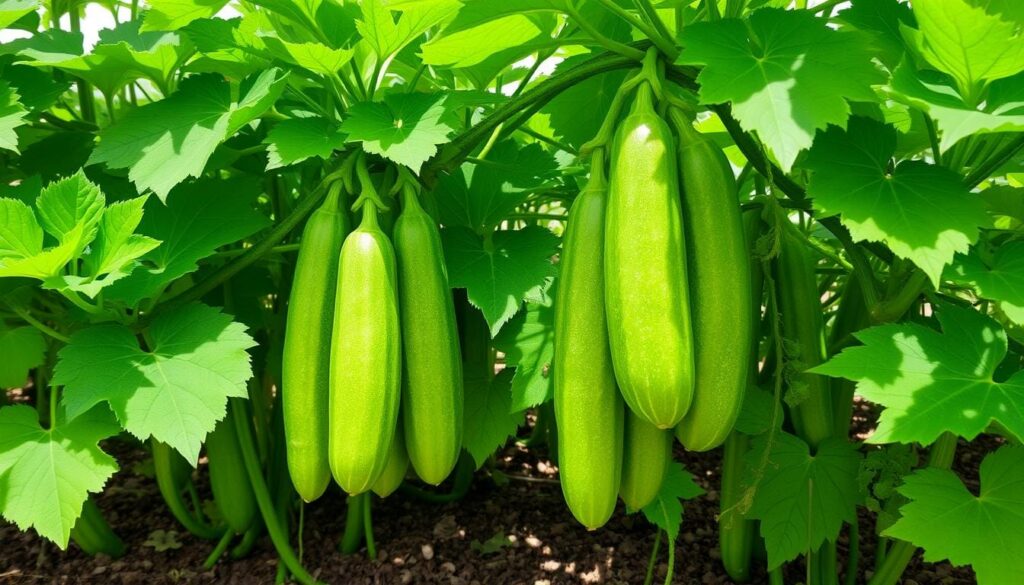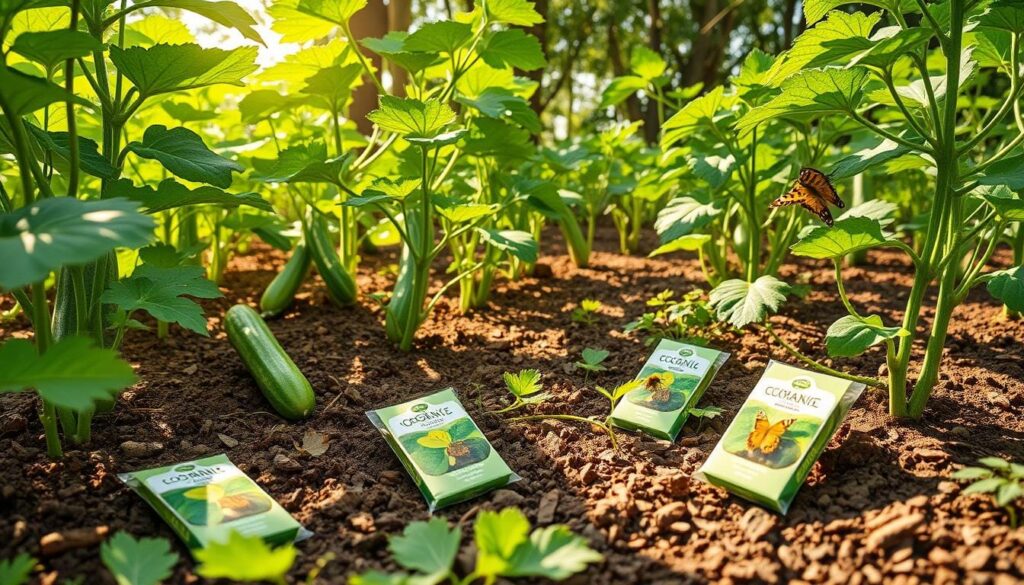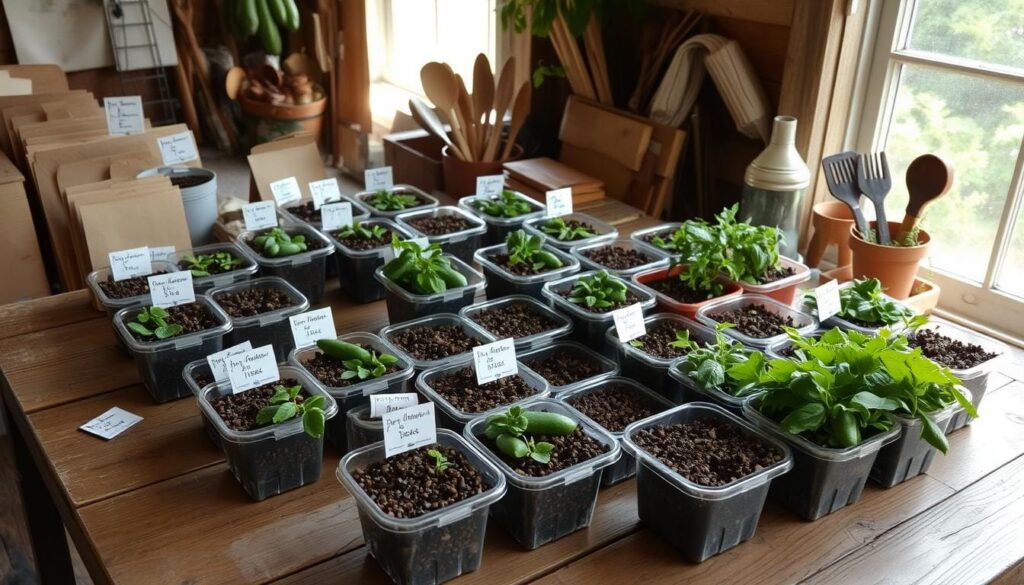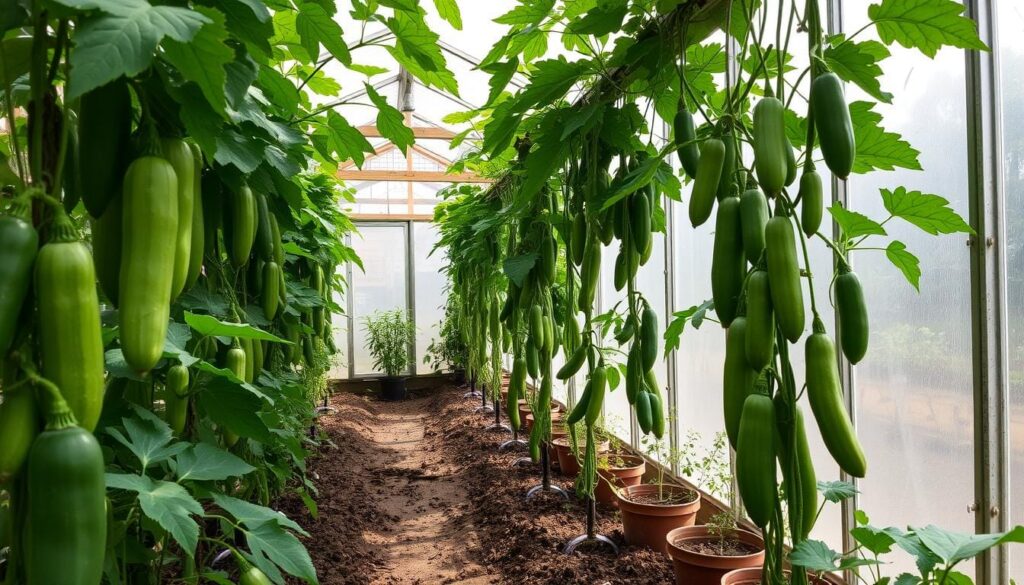We gardeners know the secret to a great garden is the right seeds. For cucumbers, disease resistance is key. We’ve seen the benefits of growing disease-resistant cucumbers and we’re eager to share our findings.
Last summer, our neighbor Mary had a lot of fresh cucumbers. She used Marketmore 76, a disease-resistant variety. Her cucumbers were healthy, unlike ours, which got powdery mildew.
Seeing Mary’s success, we looked into disease-resistant cucumber seeds. We explored the best varieties and their benefits. This guide will show you the science behind disease resistance and how to grow these hardy plants.
Key Takeaways
- Disease-resistant cucumber seeds offer increased yield and productivity with reduced need for chemical treatments.
- Popular disease-resistant varieties include Marketmore 76, Straight Eight, and Lemon Cucumber.
- Choosing the right seeds and following proper planting and care guidelines are crucial for successful disease-resistant cucumber cultivation.
- Understanding common cucumber diseases, such as powdery mildew and downy mildew, can help gardeners identify and address issues effectively.
- Incorporating organic growing practices can further enhance the health and resilience of disease-resistant cucumber plants.
Understanding Disease Resistant Cucumber Seeds
Gardeners know how vital it is to grow healthy cucumbers. Understanding disease resistance in cucumber seeds is key. This means the plant can fight off diseases like powdery mildew and downy mildew.
What Does Disease Resistance Mean?
Disease resistance in cucumbers comes from breeding and genetic engineering. Breeders look for natural defenses in plants. They then create new varieties that can fight off diseases better.
Importance of Disease Resistant Varieties
Disease resistant cucumbers are a big win for growers. They need less chemical treatment and grow healthier. This makes gardening more sustainable and eco-friendly.
Heirloom cucumbers are loved for their taste and look. But they might not be as disease resistant as some hybrids. So, knowing about disease resistant seeds is important for gardeners who want quality and reliability.
Benefits of Growing Disease Resistant Cucumbers
Gardeners who grow high-yield cucumber hybrids with disease resistance see big benefits. These strong varieties increase productivity and cut down on the need for chemicals. This makes them great for those who care about health and want to garden in a green way.
Increased Yield and Productivity
Disease resistant cucumber hybrids fight off common diseases well. This lets them grow strong and produce lots of fruit. They give much higher yields than weaker cucumbers.
Reduced Need for Chemical Treatments
Another big plus of growing disease resistant cucumbers is less use of chemicals. These tough plants can fight off many diseases on their own. This is good for the planet and for gardeners who want to grow cucumbers naturally.
| Trait | Disease Resistant Cucumbers | Conventional Cucumbers |
|---|---|---|
| Yield | Higher | Lower |
| Need for Chemical Treatments | Reduced | Increased |
| Environmental Impact | Lower | Higher |

“Incorporating disease resistant cucumber varieties into our gardens has been a game-changer, allowing us to enjoy bountiful harvests while minimizing our reliance on chemical interventions.”
Choosing disease resistant cucumber hybrids is a smart move for gardeners. It leads to healthier, more productive plants. It also helps make gardens more sustainable and eco-friendly.
Popular Disease Resistant Cucumber Varieties
There are many disease-resistant cucumber varieties that stand out. They perform well and are resilient. Let’s look at three popular ones that do well in many gardens.
Marketmore 76
The Marketmore 76 is a top cucumber cultivar for its disease resistance. It has long, dark green fruits that are crisp and slightly sweet. It’s great for eating fresh or pickling, making it versatile.
Straight Eight
The Straight Eight cucumber is known for its long, straight fruits and deep green color. It’s a heirloom cucumber variety that fights off diseases like powdery mildew and angular leaf spot. Its flavor is classic and mild, loved by many.
Lemon Cucumber
The Lemon cucumber is a standout in the garden. It has round, pale yellow fruits that look like lemons. These cucumbers are crisp, refreshing, and tangy-sweet. They’re also disease-resistant, making them reliable for gardeners.
| Variety | Growth Habit | Flavor Profile | Disease Resistance |
|---|---|---|---|
| Marketmore 76 | Long, dark green | Crisp, slightly sweet | Powdery mildew, downy mildew |
| Straight Eight | Long, straight, deep green | Mild, classic cucumber taste | Powdery mildew, angular leaf spot |
| Lemon Cucumber | Round, pale yellow | Crisp, tangy-sweet | Powdery mildew, downy mildew |
Exploring these cucumber cultivars and heirloom cucumber varieties helps gardeners find the best disease-resistant option. Whether you like the classic Marketmore 76, the unique Lemon cucumber, or the dependable Straight Eight, these varieties offer great taste and health for your garden.
Choosing the Right Seeds for Your Garden
Choosing the right seeds for disease resistant cucumbers is key for a great harvest. As gardeners, we face a big challenge with so many seed options. But, by focusing on a few important factors, we can pick the best organic cucumber seed suppliers and disease resistant cucumber seeds for our gardens.
Factors to Consider
First, think about your garden’s climate and conditions. Is your area warm and humid, or cool and dry? Knowing this helps pick the right seeds for your local weather.
Then, think about your garden’s size and how you plan to use your cucumbers. Do you have a small space for compact plants, or a big area for vines? Choosing the right seeds for your garden size and needs will help you get the most from your harvest.
Seed Source and Quality
Finding good organic cucumber seed suppliers is as important as the seeds themselves. Look for vendors known for disease resistant cucumber seeds and organic growing. Make sure the seeds look plump and unblemished, and have a high germination rate.
By carefully choosing your cucumber seeds, you’ll be on your way to a healthy, disease-resistant crop. This will not only taste great but also feed your family well.
Planting Guidelines for Cucumber Seeds
To grow greenhouse cucumber growing and manage cucurbit disease, pay close attention to planting. These steps will help you get a lot of fresh, healthy cucumbers.
Best Time to Plant
Spring is the best time to plant cucumber seeds. Wait until the soil is warm and there’s no frost. Plant your seeds two to three weeks after the last frost.
Soil Preparation
Cucumbers love well-drained, rich soil. Before planting, make your garden bed ready. Add compost or aged manure to improve the soil. Make sure the soil is soft and can hold roots well.
- Loosen the soil to a depth of 8-12 inches using a rototiller or garden fork.
- Mix in 2-4 inches of organic matter, such as compost or well-rotted manure.
- Smooth the surface and create raised mounds or hills for planting the cucumber seeds.
By following these steps for greenhouse cucumber growing and managing cucurbit disease, your cucumbers will thrive. You’ll enjoy a big harvest.
Caring for Your Cucumber Plants
Keeping your cucumber plants healthy is key for a great harvest. Follow the best ways to water, fertilize, and manage pests. This will help your cucumbers grow well and fight off diseases.
Watering and Fertilization
Watering your cucumber plants right is very important. They need steady moisture to grow well. Water them deeply, about 1-2 inches a week, depending on the weather and soil.
Don’t overwater, as it can cause root rot and diseases. Also, add a balanced, organic fertilizer every 4-6 weeks. This gives them the nutrients they need to grow strong.
Pest Control Strategies
- Use integrated pest management (IPM) to fight pests like cucumber beetles, aphids, and spider mites.
- Try organic methods like introducing beneficial insects, using neem oil, or row covers to keep pests away.
- Check your plants often for pests and deal with them quickly. This keeps your cucurbit plants healthy.
By caring for your cucumber plants well, you’ll get a lot of healthy cucumbers. Working with organic seed suppliers and learning about disease management can also help your garden thrive.

Recognizing Common Cucumber Diseases
As gardeners, knowing about common cucumber diseases is key. Two big problems are powdery mildew and downy mildew. These diseases can hurt the health and yield of our disease resistant cucumber seeds.
Powdery Mildew
Powdery mildew is a fungal disease. It shows up as white, powdery growth on leaves, stems, and fruits. This can slow down plant growth, cut yields, and even kill plants if not treated.
To spot powdery mildew, look for white, powdery patches. These patches spread over the plant’s surface.
Downy Mildew
Downy mildew is another big cucurbit disease management issue. It causes yellow, angular lesions on leaves. These lesions can turn brown and die.
Downy mildew loves cool, humid weather. This makes it a big worry for gardeners in certain areas.
Spotting these diseases early is key to managing them. By staying alert and acting fast, we can keep our cucumber plants healthy and productive.
How to Store Disease Resistant Seeds
Keeping your cucumber seeds healthy is key for a great garden. As experts in organic seeds, we know how important it is to store them right. This way, your seeds stay good for many seasons. Let’s look at the best ways to keep your cucumber seeds safe.
Proper Storage Conditions
To keep your disease resistant cucumber seeds in top shape, you need the right storage spot. Here are some important things to think about:
- Temperature: Keep the storage area between 40°F and 50°F (4°C and 10°C). Avoid very hot or cold spots, as they can harm the seeds.
- Humidity: Keep the humidity low, around 30-50%. Too much moisture can cause the seeds to spoil and grow mold.
- Airtight Containers: Use airtight containers like glass jars or foil pouches to keep the seeds dry and safe from air.
- Dry Environment: Make sure the storage area is dry and has good air flow. Using desiccant packets can help keep the seeds dry.
Shelf Life of Cucumber Seeds
With the right storage, disease resistant cucumber seeds can last for years. But, the exact time depends on the seed type and growing conditions. Here’s a general rule:
| Seed Type | Shelf Life |
|---|---|
| Organic Cucumber Seed | 3-5 years |
| Disease Resistant Cucumber Seed | 4-6 years |
It’s smart to label your seed packets with the date you harvested them. This way, you can use them before they lose their potency.

Proper storage is crucial for keeping your cucumber seeds healthy and disease resistant. By following these tips, you can enjoy a rich harvest for many seasons.
Organic Growing Practices
We love gardening and know it’s key to use eco-friendly methods. Growing cucumbers organically is great for our plants and the environment. It lets us avoid harsh chemicals and make a garden that’s in tune with nature.
Benefits of Organic Gardening
Organic gardening uses natural stuff to feed the soil and protect plants. It keeps the ecosystem balanced and makes sure our veggies are safe. By picking organic cucumber seed suppliers, we give our plants the best start.
Organic Pest Control
Organic cucumbers need less chemical help because they’re disease-resistant. But, pests can still be a problem. We use natural ways to fight pests, like beneficial bugs and organic sprays.
Organic gardening makes our garden healthy and sustainable. It gives us lots of cucumbers and helps our local ecosystem. As organic cucumber seed suppliers, we help our customers grow disease-resistant cucumbers in a green way.
Frequently Asked Questions About Cucumber Seeds
We often get asked about growing cucumbers. People want to know if they can grow in containers and how long they take to mature. We’ll look into these questions and how disease-resistant cucumbers grow in different places.
Can I Grow Cucumbers in Containers?
Yes, you can grow cucumbers in containers! They do well in both garden beds and pots. For containers, pick compact varieties like Marketmore 76 or Lemon Cucumber. These fit well in small spaces like balconies or patios.
Make sure your container is at least 12 inches deep. This helps your cucumbers grow well and produce a lot.
How Long Do Cucumbers Take to Mature?
The time it takes for cucumbers to mature varies. Most disease-resistant types take 50 to 70 days. But, things like temperature and soil quality can affect this.
Straight Eight cucumbers might be ready in 50 days. Lemon Cucumbers could take up to 70 days. Keep an eye on your plants and they’ll grow faster.
Knowing how cucumbers grow and how long they take helps gardeners. It makes planning for a good harvest easier.

Conclusion: Enhancing Our Garden with Disease Resistant Seeds
Disease resistant cucumber seeds bring many benefits to gardeners and farmers. They help us grow more food with less chemical use. This makes our plants healthier and more able to fight off diseases.
As we look to the future, cucumber breeding is getting better. Breeders are working hard to create seeds that grow well in many places. This means we can enjoy more cucumbers from our gardens.
Using disease resistant seeds is key to growing food in a green way. These seeds help us get more food without harming the environment. They also make our gardens healthier, which is good for all living things.
By choosing the right seeds, we can make our gardens better. We help the planet and get to enjoy fresh cucumbers. It’s a win-win situation for everyone.

